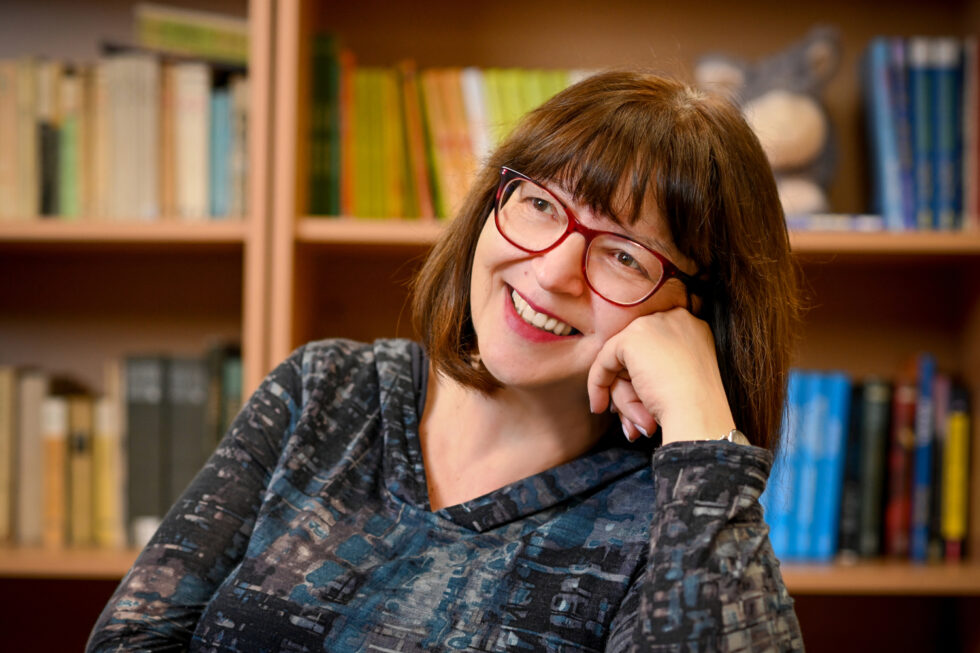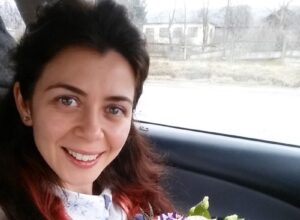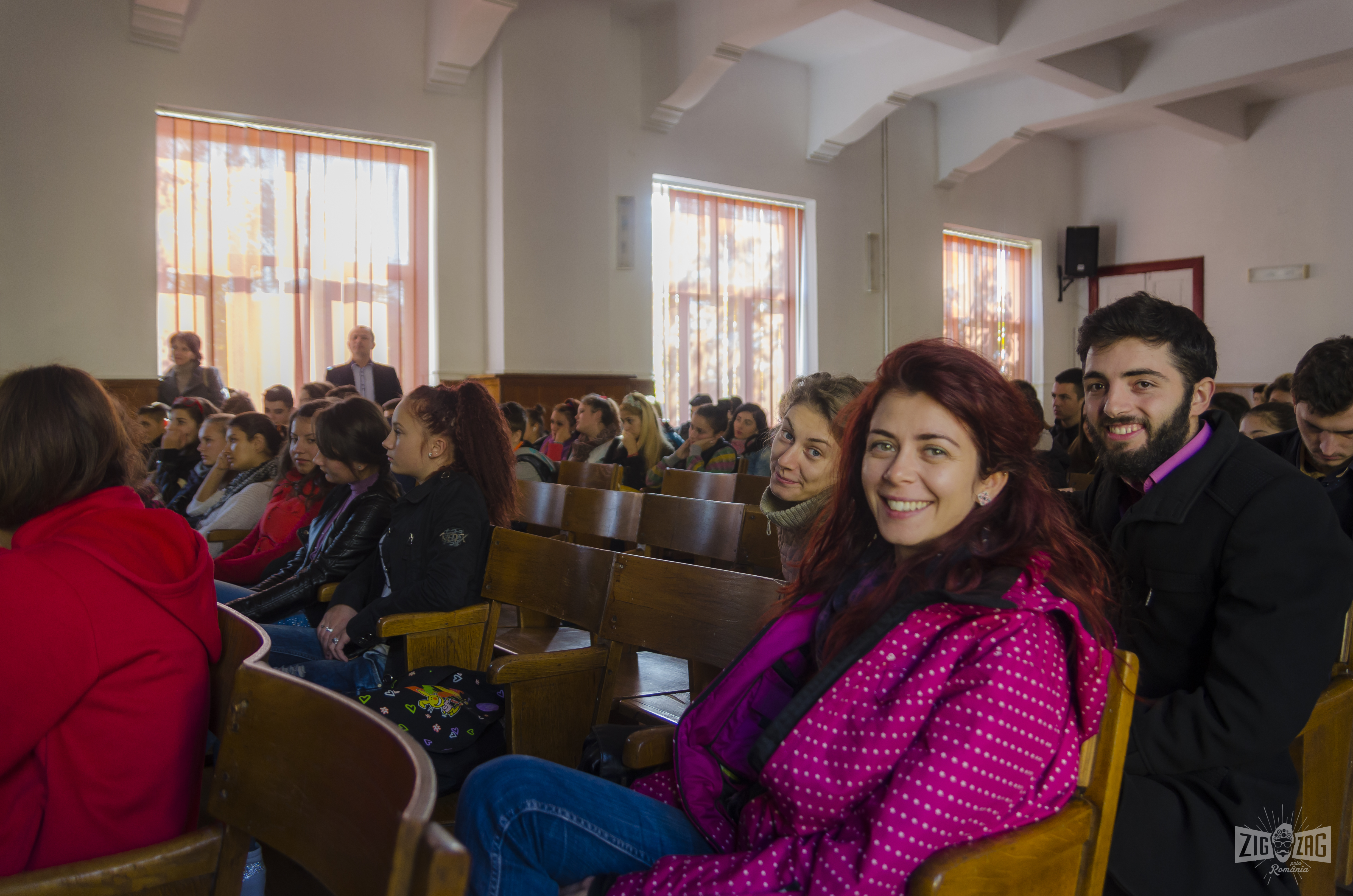
Foto: Doria Drăgușin
This profile was published in Romanian on the Merito website. This project highlights passionate teachers in Romania who seek methods to engage students in school and prepare them for the future. In the past six years, I have written nearly 60 profiles similar to this one for the Merito project.
Laura Borbe is a Social Sciences and Humanities teacher at „Mihai Eminescu” High School in Cluj-Napoca, Romania.
***
Laura Borbe writes on the board: „Poverty can hinder talented, hardworking, and gifted children and young people from fulfilling their potential.” The 30 students from 11th grade B, for whom she is the class master, must argue whether they agree or disagree with this statement during this activity in the Different Week. The teacher asks them to move to different desks based on their opinion: if they are in favor, they sit in the middle, and if they are against, they sit in the other two rows. Two philosophy students from Babeș-Bolyai University and their professor also participate in the debate, encouraging the students to participate, express their opinions, and formulate hypotheses.
The most vocal participants agree that poverty can limit children and young people. One boy mentions that impoverished individuals are marginalized in school and society. Someone else points out that education is not necessarily a top priority for someone poor, while another student talks about the need for more security for people with limited incomes. Eventually, a student from the opposing side gains the courage to speak up: „Yes, but it depends on the individual how motivated they are to change their status, to no longer be poor. After all, school is mandatory and free.” The students express their opinions individually, pausing for thought between speakers, and the philosophy students also contribute to the discussion.
Laura, wearing a hoodie dress, sneakers, red-framed glasses, and a French-style haircut with bangs, observes the discussion from the back of the class. Sometimes she smiles discreetly. At one point, a girl sitting cross-legged on a chair expresses her contrasting opinion in a low but dismayed voice. The teacher gently touches her chin and signals her to pay attention to the discussion.
At the end of the class, the teacher invites the students to complete a form on Google Forms: how comfortable they felt speaking up or remaining silent. What were the best arguments they heard? How important do they consider research before a debate? Did they learn something new from the perspective of argumentation? What could they do to improve their debating skills, and what could she do? What connection exists between these skills and everyday life?
The students had one month to research, and the teacher plans to continue working with them on poverty because she expects them to justify their opinions scientifically. She wants to teach them how to write papers based on serious bibliographies and with a proper structure. However, she mentions that they have remained in the realm of stories about personal experiences circulating among friends. She believes her goal is to encourage independent thinking, so she uses various methods to trigger reflection.
„I like to annoy them because that’s when they start thinking. A bit of frustration is needed for learning to occur, to take a stand, to have reactions.”
For example, she tells them she won’t give them a grade higher than five (out of a maximum of ten), no matter what they do. From there, she shifts the discussion toward motivation. „What’s important to you: the grade, your opinion of me, or the fact that you work to be smart?” She keeps rolling out questions until they find their intrinsic motivation.
Or, because in philosophy, there are pros and cons to every idea, she introduces certainties and then dismantles them. For instance, one day, she tells them about Jean-Jacques Rousseau’s theory that humans are naturally good and that society corrupts and makes them bad, and the students leave convinced that Rousseau is their idol. But the next day, she talks to them about Thomas Hobbes, who believes human nature is fundamentally selfish and violent.
„If you manage to capture their attention, you shake them up. Many have come to ask me, ‘Whom should I believe now? Whose side should I take? But what do you actually think?’ I know exactly why they do this—to learn not to be obedient, not to be fanatics, not to be intolerant, not to be easily manipulable.”
Or they watch a short film together, and she gives them topics to think about. Like what happened a few years ago on a Friday when she watched a speech by Daniel David, the rector of Babeș-Bolyai University, about Free Will with a 12th-grade class. On Monday morning, all the students were late for her class.
„We didn’t sleep the whole night; we argued like cats and dogs,” they said when she scolded them for being late. „You messed with our heads with that Daniel David thing; you ruined us! What do you mean I’m not free? If I have this jacket on, I decided to buy it, I decided to wear it. How can you say I didn’t decide?”
Other times she resorts to small gestures, which educational psychology books say are not recommended, like calling out students’ names to speak.
„Let’s not say, ‘Gigel, you speak.’ Because that blocks them, it makes Gigel sigh. But better to sigh than to sleep. It means he’s alive.”
Laura is 54 years old and has been teaching at „Mihai Eminescu” since 2000. She says she learned these methods, and many others, at the Noi Orizonturi Foundation, with which she has been collaborating since 2008. From 2015 to 2019, she worked full-time at the Foundation and part-time at the high school. In 2019, she took a sabbatical year from the teaching position to work solely at the NGO. There, she learned that moments of reflection on an experience are much more important than the methods.
„There comes a moment when you are no longer interested in how to do it but why. That’s the turning point. That’s when you start becoming a good teacher.”
This is how experiential learning could be defined, a method in which Laura is a trainer on behalf of the Foundation. She shows teachers that stories in which the moral is not revealed, and games used differently from what the instructions in the box dictate can provoke deep discussions and reflection among students.
„From my point of view, the only essential thing in life is to reflect. To be able to look at how you think and how others think. Sometimes you have to look at nonverbal language. And that’s how you build relationships, how you build success.”
Laura is also a trainer for the Aspire project in „Understanding by Design.” This pedagogical approach helps teachers plan their learning units starting from assessment and organize their instruction more efficiently while encouraging critical thinking and the practical application of knowledge. Specifically, it begins with the teacher’s aims for the students and the assessment rather than starting with learning as commonly done.
When she first attempted to organize her teaching according to this strategy in 2020, she encountered a lack of performance standards.
„What does it mean to know a grade five in math? It’s not known. So, what does it mean to know a grade five in philosophy? It depends on how I feel.”
However, recently she discovered a handy tool, „my friend AI,” as she calls it. That is Chat GPT, an artificial intelligence system that utilizes deep learning algorithms. For example, she asks it to list the skills someone competent in argumentation should have. After Chat GPT describes the competency, she formulates the questions through which she verifies this ability.
Currently, she is working on methods to make the „Understanding by Design” approach easier for students. For more predictability, she gives students a PowerPoint document at the beginning of each chapter, explaining the lessons the learning unit will contain, the competencies they will develop, how they will be assessed and when, the evaluation criteria, and the grading rubric.
All the methods and approaches she applies aim to prepare students to use the information and solutions practically in their lives.
„I’m not interested in them memorizing what Aristotle said, what Plato said,” she says. „If a child tells me, three months after studying Kant, ‘I can’t do this because it wouldn’t be moral. I wouldn’t respect the other person’s autonomy of thought,’ they don’t need to mention that this is Kant’s perspective, but what matters? Kant is dead; he won’t mind. But when I hear that they remembered that the other person also has a brain and freedom of choice, that’s it. That’s it! That’s something you can quantify, that the method worked.”
She also advises her students not to be afraid of making mistakes. „Be original, don’t make the same mistake every day. Make a different one!”


